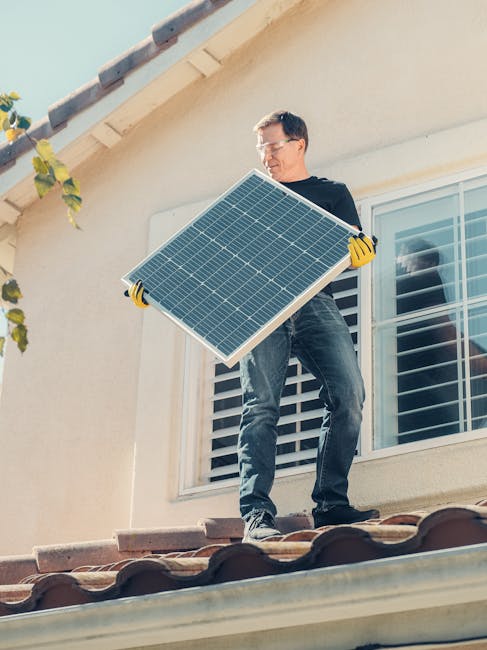Can You Heat Your House With Solar Panels?
As the world shifts towards more sustainable energy sources, many homeowners are exploring the potential of solar panels. One common question arises: can you heat your house with solar panels? The answer is yes, and this article will guide you through the various methods, benefits, and considerations of using solar energy for heating your home. Let’s dive into the details!
Understanding Solar Energy
Before we explore how solar panels can heat your home, it’s essential to understand what solar energy is and how it works.
What Are Solar Panels?
Solar panels are devices that convert sunlight into electricity. They are made up of many solar cells, typically made from silicon, which absorb sunlight and generate direct current (DC) electricity. This electricity can then be converted into alternating current (AC) electricity for use in your home.
Types of Solar Panels
- Monocrystalline Panels: Made from a single crystal structure, these panels are highly efficient and take up less space.
- Polycrystalline Panels: Made from multiple crystal structures, these are generally less expensive but slightly less efficient.
- Thin-Film Panels: Lightweight and flexible, these panels are less efficient but can be used in various applications.
How Solar Panels Can Heat Your Home
There are two primary ways to use solar energy for heating your home: solar thermal systems and solar photovoltaic (PV) systems.
1. Solar Thermal Systems
Solar thermal systems use sunlight to heat water or air directly. Here’s how they work:
- Solar Collectors: These are installed on your roof and absorb sunlight, converting it into heat.
- Heat Transfer: The heat is transferred to water or air, which is then circulated through your home.
- Storage Tanks: Heated water can be stored in tanks for later use, providing hot water for showers, washing dishes, and more.
Solar thermal systems are particularly effective for heating water, making them a great option for homes that require a lot of hot water.
2. Solar Photovoltaic (PV) Systems
While solar PV systems primarily generate electricity, they can also be used for heating through electric heating systems. Here’s how:
- Electric Heating Systems: You can use the electricity generated by solar panels to power electric heaters, baseboard heaters, or radiant floor heating systems.
- Heat Pumps: Solar PV systems can also power heat pumps, which are highly efficient and can provide both heating and cooling for your home.
Benefits of Heating Your Home with Solar Energy
Using solar energy to heat your home comes with numerous advantages:
- Cost Savings: Once installed, solar panels can significantly reduce your energy bills, as you rely less on traditional energy sources.
- Environmental Impact: Solar energy is renewable and reduces your carbon footprint, contributing to a healthier planet.
- Energy Independence: Generating your own energy means you are less affected by rising energy prices and supply disruptions.
- Increased Home Value: Homes equipped with solar energy systems often have higher property values and can attract eco-conscious buyers.
Considerations Before Installing Solar Panels
While the benefits are compelling, there are several factors to consider before installing solar panels for heating:
1. Initial Costs
The upfront cost of purchasing and installing solar panels can be significant. However, many governments offer incentives, rebates, and tax credits to help offset these costs. It’s essential to research local programs that may be available to you.
2. Roof Suitability
Your roof’s orientation, angle, and shading can impact the efficiency of solar panels. Ideally, roofs should face south and have minimal shading from trees or buildings. A professional assessment can help determine if your roof is suitable for solar installation.
3. Energy Needs
Understanding your home’s energy needs is crucial. Calculate your average energy consumption to determine the size of the solar system you’ll need. This will help you assess whether solar energy can meet your heating requirements effectively.
4. Maintenance
Solar panels require minimal maintenance, but it’s essential to keep them clean and free from debris. Regular inspections can help ensure they operate efficiently over time.
How to Get Started with Solar Heating
If you’re ready to explore heating your home with solar energy, here are some steps to get started:
- Research: Learn about different types of solar systems and their benefits. Consider your heating needs and budget.
- Consult Professionals: Reach out to solar energy companies for assessments and quotes. They can provide valuable insights tailored to your home.
- Check Incentives: Investigate local and federal incentives that can help reduce installation costs.
- Plan for Installation: Once you’ve chosen a system, work with your installer to plan the installation process.
Conclusion
Heating your house with solar panels is not only possible but also a smart investment for the future. With the right system in place, you can enjoy significant savings on energy bills, reduce your environmental impact, and increase your home’s value. As technology continues to advance, solar energy will only become more efficient and accessible. So, if you’re considering making the switch, now is the perfect time to explore the possibilities!
FAQs
Can I heat my entire home with solar panels?
Yes, with the right system and size, solar panels can provide enough energy to heat your entire home. It’s essential to assess your energy needs and choose a system that meets those requirements.
How much do solar heating systems cost?
The cost of solar heating systems varies based on the type, size, and installation requirements. On average, homeowners can expect to pay between $10,000 and $30,000, but incentives can significantly reduce this cost.
Do solar panels work in winter?
Yes, solar panels can still generate electricity in winter, even in cold or cloudy conditions. However, their efficiency may be reduced compared to sunny days. Snow can also block sunlight,




